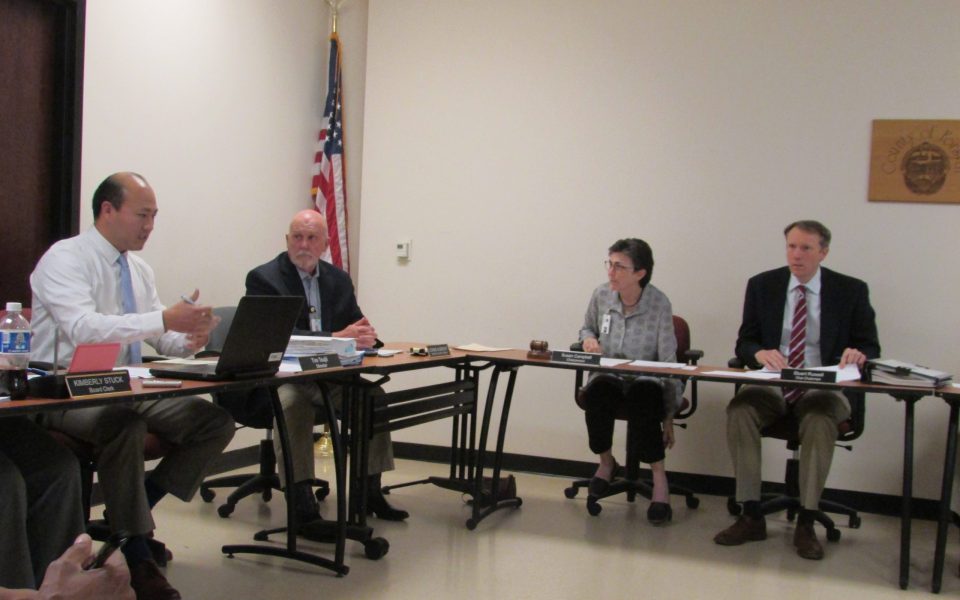Locations and times for early voting in Forsyth County await a final decision on legislation that would require all one-stop, early voting sites to be open if any site is open.
The Forsyth County Board of Elections met on Thursday to consider options, but decided to table the matter until its next meeting on Tuesday. Following the state Senate’s ratification on June 15, the bill awaits Gov. Roy Cooper’s signature. If the governor vetoes the legislation, the Republican supermajority is likely to vote to over-ride. Traditionally, both Forsyth County has opened one location at the Government Center at the start of early voting and then gradually expanded to additional sites around the county over the course of the 17-day period.
The imposed uniformity reduces the local board’s flexibility by mandating the higher costs of operating an entire complement of sites instead of only one. The board looked at two plans created by Democratic Board Chair Susan Campbell. Plan 5, with 12 sites, would cost the county $307,020, Elections Director Tim Tsujii said, while Plan 6, with only eight sites, would cost $203,940. Tsujii said the county’s FY 2018-2019 budget allocates $144,640 to pay one-stop workers, but he plans to talk to County Manager Dudley Watts on Monday to see if additional funds are available.
Both of the plans submitted by Campbell include a location at Winston-Salem State University. The site, which serves students at the historically black university, was the object of strident debate in previous years, and Republican members eliminated the location when they controlled the board of elections.
In contrast to the 2014 election, the last midterm, when Republicans controlled the board, the plans drafted by Campbell whittle down the number of sites outside Winston-Salem from four to three, retaining polling places in Clemmons, Lewisville and Kernersville, but dropping a location in Walkertown.
Comments by speakers who addressed the board predictably reflected a partisan rural-urban split.
Jim Norris, a Democrat who lives in Winston-Salem told board members: “There’s a lot of evidence that the places that are allowed for early voting and the times that are allowed for early voting are very biased against marginalized communities.
“Those same people really need to have precincts open for them to do early voting that are close to them,” he added. “Many of them do not have transportation. They have to go on bus routes. This is extremely important. We’re talking about democracy here.”
Beverly Lung, a conservative Republican in Walkertown, argued that rural residents are at a disadvantage.
“When you’re out there in Tobaccoville and Rural Hall and Belews Creek and out in the outer areas where we still have citizens that have no buses and no public transportation… how do we get around town?” she asked. “We have to find a friend or a neighbor or whatever if you have car trouble or whatever. I also am old enough where Election Day was the only day we had to vote on, and we figured out how to get to the polls on Election Day.”
Both of Campbell’s plans also drop Winston-Salem sites at Old Town Recreation Center and Sedge Garden Recreation Center. Questioned by Republican Vice-Chair Stuart Russell about the changes, Campbell said Polo Park Recreation Center or alternately Reynolda Manor Library could serve Wake Forest University students instead of Old Town, and that turnout at the Sedge Garden Recreation Center in southeast Winston-Salem was low, suggesting the location wasn’t needed. The plans both retain Mazie Woodruff Center, a popular location in northeast Winston-Salem, while adding St. Paul United Methodist Church on the east side of Winston-Salem and Southside Library. The more ambitious plan also includes polling places at Brown & Douglas Recreation Center, Miller Park Recreation Center and Sprague Street Recreation Center.
SB 325, the election bill awaiting Gov. Cooper’s signature, also eliminates the final Saturday of early voting, and moves the 17-day period back from Thursday to Wednesday. The legislation mandates that early-voting sites are open each weekday from 7 a.m. to 7 p.m., but gives the local boards the option of scheduling early voting on Saturdays and Sundays during the two middle weekends of the early voting period, which runs this year from Oct. 17 to Nov. 2.
Join the First Amendment Society, a membership that goes directly to funding TCB‘s newsroom.
We believe that reporting can save the world.
The TCB First Amendment Society recognizes the vital role of a free, unfettered press with a bundling of local experiences designed to build community, and unique engagements with our newsroom that will help you understand, and shape, local journalism’s critical role in uplifting the people in our cities.
All revenue goes directly into the newsroom as reporters’ salaries and freelance commissions.


Leave a Reply